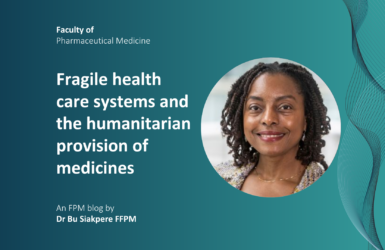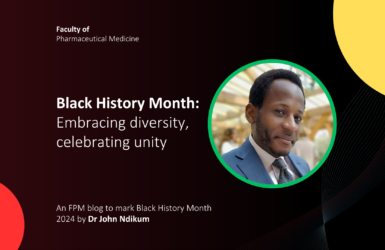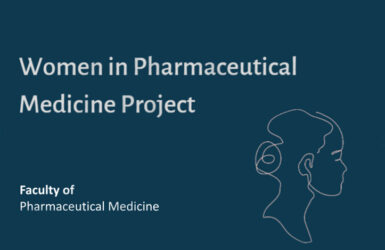Interview with Sangeeta Sharma
Posted on: Tuesday 6 September 2022
Author: FPM
To mark South Asian Heritage Month 2022, we were delighted to arrange an interview with Dr Sangeeta Sharma.
Dr Sharma outlines her specific experiences of being a pharmaceutical physician from a South Asian heritage. She is a Fellow of FPM (FFPM) and a DPM examiner.
How to cite:
Faculty of Pharmaceutical Medicine blog (2022), ‘Interview with Sangeeta Sharma’, 6 September 2022. Available at: https://www.fpm.org.uk/blog/interview-with-sangeeta-sharma/
Please note, this blog features the personal opinions of Dr Sharma which are not necessarily the views of the Faculty of Pharmaceutical Medicine.
Please could you tell us your name and a little bit about yourself?

Sangeeta Sharma.
I am a physician within the pharmaceutical industry and mum to a teenage son who is currently studying for his A levels. I was born in the UK of Indian parents and moved to Ireland when I was one, where I completed my schooling, degree and clinical jobs. I moved to the UK 21 years ago starting my career path in industry. I have an interest in history, specifically about medical history and the history of India. My library consists of books on the Mughals, the British Empire and the last rulers of the Punjab. I enjoy cooking especially Indian dishes but also vegetarian and vegan dishes from other regions of the world.
Please could you tell us about your career journey? For example, how you moved into pharmaceutical medicine, your special interests?
I started off my career in surgery with the aim of becoming a paediatric urologist. I was advised after my paediatric surgical rotation to take some time to do some lab-based research in urology which I did for two years. During this time, I was approached by a pharmaceutical company to become the investigator for their clinical trial in OAB (Over-Active Bladder) and interacted with the CRA (Clinical Research Associate). I developed an understanding of the clinical trial process as well as gained insight into the pharmaceutical industry. As my research role was coming to an end, I made a decision to look for roles within industry because of the types of roles available, the variety of therapy areas and the potential impact on a larger population of patients which interested me more than going back to surgery.
When and why did you join FPM? What does it mean to you?
I joined FPM in 2009 to find out more about the role of the pharmaceutical physician, access education through faculty events as well as PMST which I completed in 2014. Although I had experience in clinical research and medical affairs, PMST provided me with additional information as well as knowledge and insights into other areas of the pharmaceutical industry such as regulatory and pharmacovigilance where I had limited experience. This was invaluable when I moved into my role as UK Medical Director where I required this additional knowledge. FPM is important to me as a resource of information about the industry in the UK, trends within industry, education and training and the opportunity to network. Through FPM I have been able to have my voice heard, provide input to the evolving PMST training and competencies, as well as becoming an examiner for the DPM and helping shape the journey for the next generation of pharmaceutical physicians.
The theme for South Asian Heritage Month 2022 is Journeys of Empire. What is your opinion and perspective (if any) on historical empires?
I am in the UK as a result of the British Empire but I wonder what my life and journey would have been like without the Empire. The British Empire brought the English language and way of living to the South Asian continent. However, many would say this was at the cost of loss of indigenous life, loss of culture and language, loss of wealth, art, architecture, sculptures, scriptures and jewellery, much of which are now housed in private collections or museums within the UK. Many would also say the Empire fuelled religious intolerance in society through the “divide and rule” policy of the East India company and the British Raj. People within the Empire were seen as second-class citizens, uncivilised and ignorant, even in their own country. The Empire provided Great Britain with lands, people and resources to fuel their advancement and wealth at the cost of the local indigenous population. The end of the British Empire in the “India” 75 years ago created India and Pakistan which resulted in rioting, looting, mass migration and loss of life estimated to be two million, as well as lingering intergenerational trauma. We cannot change history but we should acknowledge it, learn from it and also teach the new generations of Empire and its lasting legacy, positive as well as negative. We should learn about the effects on the people who were subject to different empires and the resulting feelings of inferiority, colourism, religious intolerance and gender inequality and which have been passed down the generations and are still being felt.
In medicine, there is an ongoing debate around equality, diversity and inclusion. As a doctor of South Asian heritage, what are your thoughts on this?
There should be no debate that this is a problem which has not been addressed adequately. The recent BMA ‘Racism in medicine’ survey report has highlighted ‘racism is widespread within the medical workforce’, with ‘many respondents’ feeling ‘that racism was a barrier to their career progression’1. In this vein, doctors of South Asian heritage do not get the same opportunities for progression and are subject to institutional racism. And if female, this inequality increases.
Could you tell us about a particular hurdle you had to overcome in order to gain recognition during your career?
My first hurdle was getting a job in industry. I was told by a prominent recruiter that with my surgical background I would never get a role in medical affairs in pharma. I persevered and took opportunities within clinical research to eventually move into medical affairs. It is my personal opinion that since the recruiter had placed male non-Asians with similar backgrounds to mine in medical affairs roles, they may have harboured racist and/or sexist sentiments.
Did you have a personal advocate who you could call on to seek advice?
I have been lucky to have some amazing bosses who have provided advice when I needed it and even when I was no longer working with them. Shout out to Dr Gurdyal Kalsi and Dr Asad Khan.
Do you think things have improved for young doctors of similar heritage to yourself?
Yes, I think they have, but that doesn’t mean that the problem has disappeared. I see more diversity within teams and I see progression for people of South Asian heritage, but not at the same rate as our white counterparts, but this is only my experience.
What advice would you give your younger self (18 years old)?
I would tell my younger self to believe in herself, that she is good enough and that the colour of her skin or heritage will not matter in whatever she wishes to achieve.
What is your favourite food from your heritage and what does it mean to you?
My favourite food is Punjabi Kadhi, which is made of yoghurt and gram flour and has gram flour dumplings, served with basmati rice and authentic mango pickle. It reminds me of summers in India with my grandmother.
- BMA Racism in Medicine Survey Report (June 2022), <https://www.bma.org.uk/media/5746/bma-racism-in-medicine-survey-report-15-june-2022.pdf> [accessed August 2022] (pp.3, 28).
This interview was set up via the FPM EDI Forum.
See more from the FPM EDI Forum

Pharmaceutical physicians, fragile health care systems and the humanitarian provision of medicines
A blog by Dr Bu Siakpere FFPM

Striving for better patient care and outcomes with our drugs — pharmaceuticals and “companion” genomic testing
Join our fundraiser

Interview with Sangeeta Sharma
From September 2022
A blog celebrating South Asian Heritage Month 2022

What does it mean to be a Hero(ine), Unsung: The Windrush Generation A Pillar of Modern Britain
Blog article by our Chief Executive Dr Marcia Philbin

Understanding and responding to the impacts of COVID-19 on women’s health
Dr Sheuli Porkess examines the disproportionate impact of the pandemic on women and women’s health

Hidden Figures of the NHS – A personal history
Blog article by our Chief Executive Dr Marcia Philbin












